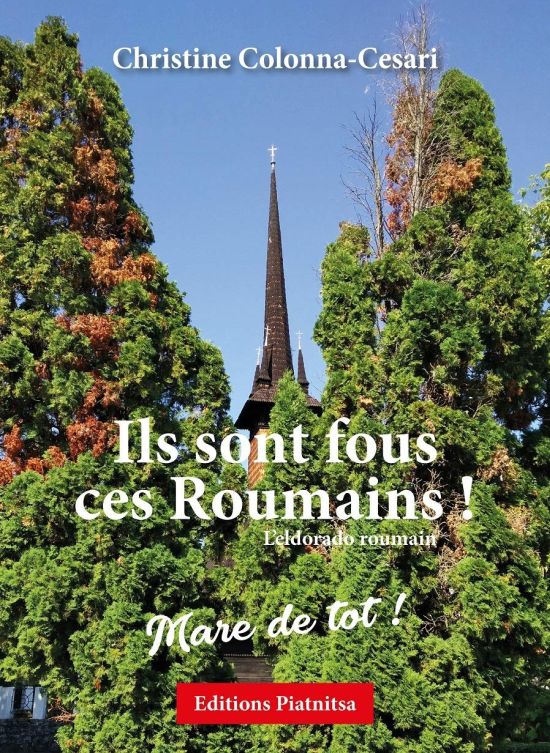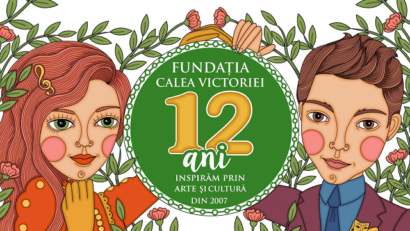On Romanians, from a different perspective
The traditions, customs and hospitality of Romanians impress foreign visitors, as does the breathtaking scenery waiting to be discovered here.

Ana-Maria Cononovici, 11.06.2024, 14:26
A book has been released recently, first in French and a few years later in Romanian as well, in which the French writer Christine Colonna-Cesari, who has been living in Romania for a while, guides readers towards in-depth knowledge of our country in “Ils sont fous ces roumains! L Eldorado Roumain!”.
Romania has been known internationally as the country where many Europeans took shelter in the interwar period. Christine Colonna-Cesari, who came to Romania after she retired in 2018, told us more about the perception foreigners have of our country:
Christine Colonna-Cesari: “In 2018 I decided to leave France and retire in Romania, because it was a country and a culture that I had long known and appreciated. My plan was to carry on my work as a writer and book editor, I have several books selling in France. I had long intended to put together a nice album showcasing the beauty of Romania, which is still little known in France, where rather stupid stereotypes about this still exist. And I wrote this book in 2019, and then I managed to have it published in Romanian as well.”
What does a foreigner find surprising when reaching Bucharest?
Christine Colonna-Cesari: “It is quite surprising, first of all, as I already mentioned, the signs are very different from the ones in France, so it’s quite easy to get lost. Street names and numbers are not easy to see, there are no big signs everywhere, but as far as I could see for Romanians this is not a problem. They are used to it. And there are also other surprising things, which make a big difference. One thing that may seem like a detail is the practice of giving people their change when shopping. When a retailer doesn’t have the right coins to give back to a buyer, they don’t see it as a big deal, and this is something you don’t see in France. For instance, if you want to buy something and you don’t have all the small change you need or the retailer doesn’t have it, it’s not a problem, everything is business as usual. You don’t see that in France, and the first time this happened to me here I asked the clerk for the change, and they were not happy. So it took some time for me to realise that this is part of the local customs. One other aspect is Romanians’ space-time management, which is completely different from the way the French do it. Here, people live more outside time, so their commitments related to appointments, dates, times get changed completely at the last minute. And for the French visitors who are not used to this, it is rather disturbing and annoying. But we get used to it and eventually come to understand that this is how things are done here. So these are the first shocks, mainly.”
In spite of this, once the initial shock wears off, Christine Colonna-Cesari says the country is charming:
Christine Colonna-Cesari: “After that, adjustment is quite easy. I speak English, and most Romanians are very good English speakers, so this helped me a lot. Secondly, the people are very nice and welcoming. You don’t see here the social violence that we have in France so I had no problems adjusting. I would like people to remember what I tried to express in this book. The depths of Romanians’ souls, the depths of their sensibility and creativity. To my mind, Romanians are more drawn to the spiritual than the French are. Romanians are a very artistically inclined nation. You can see more colours here than in France. People have a relationship with nature, with flowers, for instance, they have a fantastic relationship with flowers. I’m always surprised to meet men in the street with huge flower bouquets, you don’t see that in France. Romanians are also a very polite nation, there are small details that may seem insignificant but when you come from France you notice that people don’t push you at the underground or in the street, as they do in France. Public areas are clean, which is not the case in Paris, in particular. It’s like going back in time, in the ‘60s in France, a long-gone gentleness and a certain quality of life, the respect and civilisation that we lost in France and that I’ve come to find here.”
We also asked Christine Colonna-Cesari about the French-speaking readers’ response to her book:
Christine Colonna-Cesari: “The book was met with surprise and enthusiasm. Everybody says, I had never imagined this is what Romania is like, thank you for showing us Romania from this perspective. Overall, the response is a mix of enthusiasm, congratulations and amazement. People open their hearts and they want to come share these experience, and many of them actually do that. I have French friends who told me, ‘what you describe here is 1960s France, the same respect and gentle way of living.’ But my book is a lot more than that. I am a very observant person, and I tend to think about what happened in the past and make connections with history. Western Europeans rarely understand what Eastern Europe is about, what its values are. They don’t realise this, so they make judgements based on their own criteria, and I would like these values to go beyond borders, to help them understand the foundations of human culture in the past few centuries.”
Apart from the writer’s experiences in Romania, the book also comprises a second part, made up of reports with 220 lovely photos documenting encounters with exceptional people doing exceptional things. (AMP)






























